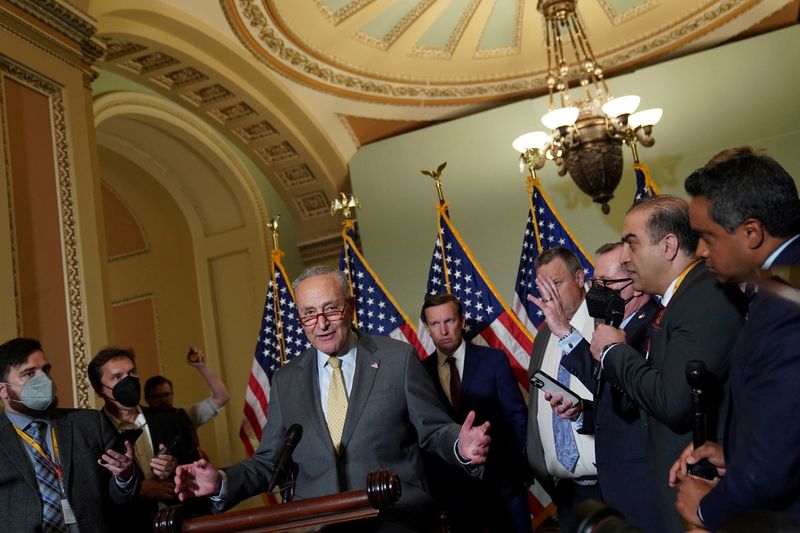WASHINGTON (Reuters) - U.S. Senate Democrats on Monday were awaiting a ruling from a chamber referee this week on whether they can override the legislature's normal rules to pass a $430 billion drugs, energy and tax bill despite Republican objections.
The decision by the referee, officially known as the "parliamentarian," will have a profound impact on President Joe Biden's domestic agenda heading into the Nov. 8 midterm elections, when Republicans are favored to win back control of the House of Representatives and perhaps the Senate amid voter discontent over inflation.
Senate Majority Leader Chuck Schumer on Monday confirmed that he planned to begin debate this week.
Under the "reconciliation" procedure Democrats are hoping to use to pass the bill, only a simple majority of votes in the 100-member chamber would be needed to steer the bill towards passage, instead of the 60 needed for most legislation.
With the Senate split 50-50 among Democrats and Republicans, the process would allow for passage as Democratic Vice President Kamala Harris could break any tie vote and secure a victory for Biden.
The bill being reviewed by the Senate parliamentarian was crafted by Democratic Senator Joe Manchin, who has often stood in the way of key Biden priorities, and with the blessing of Senate Majority Leader Chuck Schumer.
Still unknown, however, is whether Democratic Senator Krysten Sinema, like Manchin a maverick in the caucus, will lend her support.
A Sinema spokesperson said she was still reviewing the bill and would also wait to see which provisions, if any, the parliamentarian allows to stay in the bill.
Without Sinema's vote the entire effort could be doomed, as no Republicans were expected to vote yes on what Democrats are calling the "Inflation Reduction Act of 2022."
It would provide new federal funding for a significant reduction in U.S. carbon dioxide emissions that contribute to climate change and allow Medicare, the federal health insurance program for the elderly and disabled, to negotiate lower pharmaceutical prices. Tax increases aimed at the wealthy would partially offset the costs, with lower drug prices also saving the government money, the bill's backers say.
But Republicans have been attacking the measure, arguing it will violate a Biden pledge to not raise taxes on those earning less than $400,000 annually. Senator Mike Crapo, top Republican on the Senate Finance Committee, criticized the bill as he released an analysis he requested from the Joint Committee on Taxation (JCT), a nonpartisan congressional panel.
The JCT report said the bill's tax provisions would indirectly raise the effective tax burden on Americans with incomes of $200,000 or less, by $16.7 billion in 2023.
The tax burden effect in the JCT analysis is due to small estimated reductions of incomes from potential wage cuts that could result from companies' higher tax bills, or lower stock values, said Kimberly Clausing, a tax law professor at the University of California-Los Angeles and a former U.S. Treasury tax official.
The legislation would raise the tax burden by another $14.1 billion on taxpayers with annual incomes of between $200,000 and $500,000, according to the JCT analysis.
Democrats on the finance committee, which oversees tax policy, say the analysis is "incomplete."

"A family making less than $400,000 will not pay one penny in additional taxes," Ashley Schapitl, spokeswoman for the Senate Finance Committee Democrats, said in a statement. "It doesn’t include the benefits to middle-class families of making health insurance premiums and prescription drugs more affordable. The same goes for clean energy incentives for families."
(This story has been refiled to delete extraneous word in first sentence)